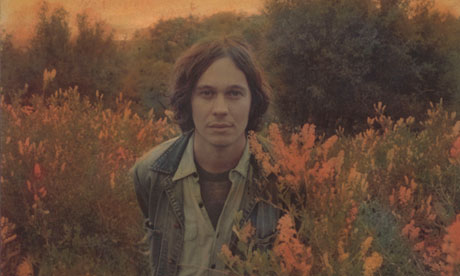
Recently, Intel-sponsored online arts channel The Creators Project turned its attention to US musician Ernest Greene. They released two short videos about the sounds Greene had used on his second full-length album under the name Washed Out. Anyone whose idea of a gripping rock doc involves a nice but unassuming 30-year-old from Georgia discussing the relative merits of digital and analogue recording techniques before concluding that there's no right or wrong way to make an album is advised to hasten to YouTube, strap themselves in and prepare for the audio-visual thrill-ride of the year.
If you can make it to the end without passing out from the excitement of it all, the one thing that seems clear from the films is that, on Paracosm, Ernest Greene is striving to do something different to his previous work. You can see why. Apparently made for want of something better to do (serving notice that Greene was perhaps not a man bursting with the feral charisma of the born rock star, his early interviews seemed less concerned with music than fretting about his ongoing failure to get a proper job after graduating from university), Washed Out's first releases landed squarely at the junction between two of 2009's hippest musical sub-genres. One was the laptop-based US reboot of early-90s shoegazing indie known as chillwave. The other was the curious, shambolic sound dubbed "hypnogogic pop", by The Wire magazine, which described it as "like listening to Beverly Hills Cop and hearing the music of the spheres, the sound that remains after the boys of summer have gone": a nice way of saying it sounded a bit like mainstream 80s pop, a bit like 60s psychedelia and a lot like something recorded on a cassette that had spent the last 20 years on the floor of a shed.
Indeed, what Greene was doing was so hip, it became a kind of musical shorthand for hipness. In the US, his best-known track remains Feel It All Around from his second EP, Life of Leisure, which became the theme tune to Portlandia, a hipster-satirising sketch show. That doesn't mean his music wasn't good. Quite the opposite: Washed Out's releases were less toothsome and loying than a lot of chillwave, the songwriting better than most practitioners of hypnogogic pop. But the problem with being so perfectly of the moment is what to do when the moment passes.
It's a conundrum Paracosm attempts to solve, if not quite as robustly as Greene has suggested. The songs still amble along at a lazy pace, the vocals are smeared with echo, the melodies are drowsily gorgeous, the basslines bear the influence of 80s R&B, and the opening It Feels All Right comes replete with the kind of intimations of Hipstamatic-hued childhood nostalgia that were a hallmark of chillwave and hypnogogic pop: "Close my eyes," runs one of the few comprehensible lyrics, "think about the old times." Certainly any Lynryd Skynryd fans who took Greene's recent and rather improbable claim that the album boasted a Southern rock influence at face value are going to be disappointed: it turns out he meant only that he'd used more real instruments than samples this time.
But from its title down, Paracosm is clearly intended as an album for listeners to immerse themselves in, and if you do, the subtle shifts away from chillwave's prevalent sunkissed mood becomes apparent. The one song that cleaves to it – Great Escape, with its vaguely Hawaiian guitars and sound that shimmers like heat haze – seems anomalous, an exception that proves the rule. Despite the fact that the songs are linked by what sound like samples from one of those relaxation CDs featuring sounds of the rainforest, at its best, Paracosm feels curiously uneasy and unfathomable. It's never anything other than mellifluous, but instruments and sounds shift in and out of focus almost at random, as if the arrangements are slipping their moorings from the actual song, or else are mixed in such a way as to draw your attention in strange directions: Greene clearly spent a lot of time coming up with the vast, crashing guitar sound on Don't Give Up, but the most prominent noise on the track is, of all things, the hi-hat cymbal.
It Feels Alright dies away amid a mass of voices, chattering and shouting: there's something unsettling about the way you can't make out what any of them are saying, or what it's meant to signify. Falling Back, meanwhile, features a middle section in which the rhythm is replaced by the sound of a crowd clapping along in time-honoured stadium-rock style. It's hard to work out whether or not it's supposed to be a joke at the expense of Greene's lack of rock-star ambition, or the music's sonambulent gait; it doesn't really feel like the sort of thing designed to provoke sports arenas full of fans into an air-punching frenzy. At moments like that, Paracosm feels perplexing in the best way: an artist whose field appeared to be pretty clearly delineated doing something you can't quite pin down. You couldn't call the album a brave leap into the unknown, but nor does it feel hackneyed. Instead, it subtly shifts the boundaries of what Greene does in a way that makes you intrigued to hear what he does next.

